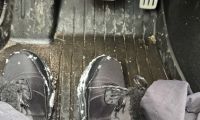Car Repair & Maintenance Warnings
Earlier this past week we learned how retread tires were made and if they are really safe and a good way to save money. In addition, we also covered some of the risks of trusting a fast lube-type service center to properly work on your car---even with something as simple as an oil change.
Today, we are taking a look at another simple automotive service that despite some mechanics and service techs knowing better about, still do that can damage your brakes leaving you stranded or worse yet…in a fatal accident. That service? Fixing a flat or putting on a new set of tires.
The Twist to This Article
Case in point: We’ve all had this happen to us at least once sometime in our lives---a flat tire incident on the road where we found it impossible or nearly impossible, to get the lug nuts off the wheel because the service tech who last touched our tires tightened the lug nuts too tight using a power wrench.
That degree of tightness is referred to as “torque”---a twisting type force to an object around a specific axis such as a lug nut to a wheel lug when securing a tire to your car during a tire change.
If you’ve hung around one of those tire service centers, you have heard the distinctive growling whine of a power tool as a service tech removes and reattaches the lug nuts during a tire change. Unfortunately, unless that power tool has a torque setting that is used correctly, you will typically wind up with the aforementioned overly-tightened lug nut problem. In most cases, the time-saving power tool is overkill and is set too high for your lug nuts.
However, there is more to the problem than inconvenience in trying to get a flat wheel off your car. As it turns out, over-torqueing the lug nuts not only damages the threads to the wheel lugs, but can also cause a warping flex of the disc brakes which are responsible for providing the majority of your vehicle’s stopping ability.
Disc Brake Basics
Disc brakes consist of a round disc-like metal rotor against which calipers containing brake pads are applied against the rotating caliper to slow down or stop a tires rotation upon application of the brake pedal or automatic braking system.
Disc brakes are superior to old-style drum brakes because of:
• Less brake fade---due to they do a better job of managing heat than drum brakes do.
• Better performance in wet conditions---with disc brakes, the rotor throws the water off while the brake pads act as wipers like a rag wiping water off of a window.
• Less likely to lock up---relative to drum brakes, disc brakes are less likely to lock up during heavy braking.
However, drum brakes have their uses too, because they are needed for their parking brake abilities. Since disc brakes expand when hot and contract when cold, they make poor parking brakes after they have cooled and shrink slightly and thereby lessening the contact between the brake pads and the disc. Drum brakes do not have this problem.
Back to the problem of over-torqueing your lug nuts, what can happen is that if too much force is applied to the nuts, then that force can transfer over to the thin rotor disc in your disc brakes and cause warpage that will at the very least interfere with a car’s braking.
Therefore, it is imperative that while nearly every nut in a car has specified torque specifications---especially in components of the engine to prevent some types of engine failure---one of the torque specifications every car owner should be aware of is those for attaching the wheels to their car.
What You Can Do About Your Lug Nuts
That said, you have two options of which I recommend you follow both whenever your tires are removed from your car by a service technician:
1. Ask the service manager to ensure your lug nuts are torqued appropriately by the tire technician using the correct tools.
2. Re-torque your wheels as soon as you can once you get home to help ensure that it was done correctly and that the lug nuts are not too tight or too loose.
To show you how to properly torque your lug nuts, here is an informative and very entertaining video by an Aussie mechanic who literally goes nuts over his nuts as he explains and demonstrates the importance of keeping your nuts tight the right way:
How to Tighten Your Wheel Nuts The Right Way
Look to Torque News for More
For more about car maintenance and repair, be sure to check out our past and future articles that covers both new and used vehicles (including Tesla and other Electric Vehicles) to help you have an enjoyable car experience and save money.
If you have a Tire Service Center horror story, be sure to tell us about it in the comments section below.
Timothy Boyer is Torque News Tesla and EV reporter based in Cincinnati. Experienced with early car restorations, he regularly restores older vehicles with engine modifications for improved performance. Follow Tim on Twitter at @TimBoyerWrites for daily Tesla and electric vehicle news.
Set as google preferred source












Comments
I had four new wheels and…
Permalink
I had four new wheels and tires put on my car Monday. The next day my check engine light came on. Thursday all my brake fluid leaked out and my brake pedal went all the way to the floor. Saturday rejected the car and looked up under it and brake fluid was all inside the wheel. I'm wondering if the tire company damaged my caliper and if so are they responsible for paying to have a new one put on
The same exact thing…
Permalink
In reply to I had four new wheels and… by Malinda (not verified)
The same exact thing happened to me. Before I even left town fair tire after getting 4 tires replaced, from 4 faulty tires that had been installed.. my anti skid warning light was on. By the time I got home 10 miles. Break system warning light.. looked under car, break fluid all over my front drivers side tire.. my breaks were fine before I got tires replaced. What happened??
I had new tires put on…
Permalink
I had new tires put on. After arriving home (about 30 miles) I noticed the brake was on. Hmmm? I checked the brake fluid, it was a little low, which is normal as brake pads wear down. I topped off the fluid anyway. The light went out for about 2 miles then came back on with the ABS light on also. I decided to jack up and support the car to take all tires and rims off. Pads are about half worn, no visible leaks. Decided to change the front brakes. Lowered the fluid level so the calipers can be taken off the rotors. Cleaned and greased the slide pins. Put new front pads on, rotors are fine. Topped off the fluid one more time. Brakes worked fine, no pulsesating but both lights still on. Disconnect the negative battery post, lights went out. Came back on.after about 2 miles. Any thoughts of what to look for next?